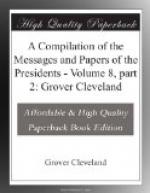The fourth clause of the same article provides, among other things, that citizens of Switzerland may, within the United States, acquire, possess, and alienate personal and real estate, and the fifth article grants them the power of disposing of their real estate, which, perhaps, would be no otherwise objectionable, if it stood by itself, than as it would seem to imply a power to hold that of which they are permitted to dispose.
These objections, perhaps, may be removed by striking out the second clause of the first article and the words “and real” in the fourth clause. An amendment similar to the last here suggested was made by the Senate in the convention between the United States and the King of Bavaria, the ratification of which, as amended, the Senate advised and consented to on the 15th day of March, 1845.
But there is another and a decisive objection, arising from the last clause in the first article. That clause is in these words:
On account of the tenor of the federal constitution of Switzerland, Christians alone are entitled to the enjoyment of the privileges guaranteed by the present article in the Swiss Cantons. But said Cantons are not prohibited from extending the same privileges to citizens of the United States of other religious persuasions.
It appears from this that Christians alone are, in some of the Swiss Cantons, entitled to the enjoyment of privileges guaranteed by the first article, although the Cantons themselves are not prohibited from extending the same privileges to citizens of the United States of other religious persuasions.
It is quite certain that neither by law, nor by treaty, nor by any other official proceeding is it competent for the Government of the United States to establish any distinction between its citizens founded on differences in religious beliefs. Any benefit or privilege conferred by law or treaty on one must be common to all, and we are not at liberty, on a question of such vital interest and plain constitutional duty, to consider whether the particular case is one in which substantial inconvenience or injustice might ensue. It is enough that an inequality would be sanctioned hostile to the institutions of the United States and inconsistent with the Constitution and the laws.




